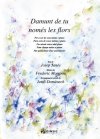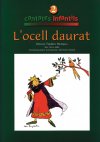
Son of a Catalan father and a mother of French ancestry, he began his music studies in Barcelona, with Pere Serra and continued them in Paris with Ferdinand Motte-Lacroix, Isidore Philipp and Marcel Samuel-Rousseau. The contact with the new French school (a concert by Gabriel Fauré in Barcelona awakened his vocation) propitiated his creative spirit. After having lived in Barcelona for 7 years (because of the First World War 1914-18), he moved to Paris and lived there from 1921 to 1941. It was in this period of time when he wrote a very significant part of his body of work. His most personal works were written for piano: Impressions Íntimes (1911-14), Pessebres (1914-17), Escenes d'Infants (1915-19), Suburbis (1916-17), Cants Mágics (1919), Fêtes Lontaines (1920), Charmes (1920-21), Trois Variations sur un Thème de Chopin (1938-57), 15 Cançons i Danses (1918-78), Paisatges (1942-60) and Música Callada (four notebooks) (1951-67).
His most important works for canto and piano are: L'Hora Grisa (1915), Quatre Medodies (1925-28), the cycle Combat del Somni (1941-51) with texts from Josep Janés, which includes the extraordinary lied Cinc Melodies about texts from Paul Valéry (1965-73), among others. He is also author of the ballet House of Birds (1956), two works for guitar: Cançó i Dansa núm.10 (1943), the oratorio Improperiae for mixed choir, baritone or bass soloist and orchestra (1963) and the cantata for children L'Ocell Daurat (1970).
Mompou has qualified his aesthetic as a 'restart'. In his work he has done without developments and artifices. His music, mysterious and refined, not influenced by schools and speculative techniques, is internationally recognized. He was as well an exceptional interpreter in his piano work, creating a self-sonorous world, and as such, he played in his country and in foreign countries. He has been awarded numerous medals and was a member of different Spanish and international cultural entities.

 Son of a Catalan father and a mother of French ancestry, he began his music studies in Barcelona, with Pere Serra and continued them in Paris with Ferdinand Motte-Lacroix, Isidore Philipp and Marcel Samuel-Rousseau. The contact with the new French school (a concert by Gabriel Fauré in Barcelona awakened his vocation) propitiated his creative spirit. After having lived in Barcelona for 7 years (because of the First World War 1914-18), he moved to Paris and lived there from 1921 to 1941. It was in this period of time when he wrote a very significant part of his body of work. His most personal works were written for piano: Impressions Íntimes (1911-14), Pessebres (1914-17), Escenes d'Infants (1915-19), Suburbis (1916-17), Cants Mágics (1919), Fêtes Lontaines (1920), Charmes (1920-21), Trois Variations sur un Thème de Chopin (1938-57), 15 Cançons i Danses (1918-78), Paisatges (1942-60) and Música Callada (four notebooks) (1951-67).
Son of a Catalan father and a mother of French ancestry, he began his music studies in Barcelona, with Pere Serra and continued them in Paris with Ferdinand Motte-Lacroix, Isidore Philipp and Marcel Samuel-Rousseau. The contact with the new French school (a concert by Gabriel Fauré in Barcelona awakened his vocation) propitiated his creative spirit. After having lived in Barcelona for 7 years (because of the First World War 1914-18), he moved to Paris and lived there from 1921 to 1941. It was in this period of time when he wrote a very significant part of his body of work. His most personal works were written for piano: Impressions Íntimes (1911-14), Pessebres (1914-17), Escenes d'Infants (1915-19), Suburbis (1916-17), Cants Mágics (1919), Fêtes Lontaines (1920), Charmes (1920-21), Trois Variations sur un Thème de Chopin (1938-57), 15 Cançons i Danses (1918-78), Paisatges (1942-60) and Música Callada (four notebooks) (1951-67).









